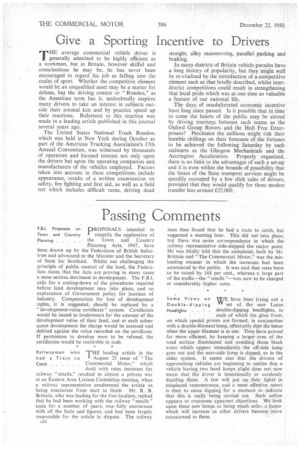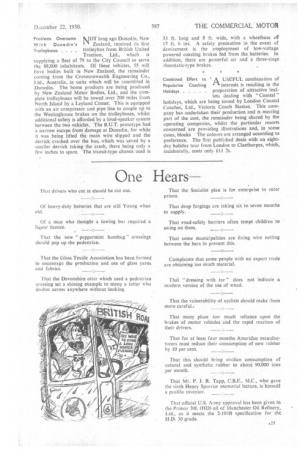Passing Comments
Page 28

Page 29

If you've noticed an error in this article please click here to report it so we can fix it.
F.B.I. Proposals on PROPOSALS intended to Town and Country I simplify the application of
Planning the Town and Country
Planning Acts, 1947, have been drawn up by the Federation of British Industries and advocated to the Minister and the Secretary of State for Scotland. Whilst not challenging the principle of public control of the land, the Federation states that the Acts are proving in many cases a most serious detriment to development. The F.B.I. calls for a cutting-down of the procedures required before land development may take place, and an explanation of Government policy for location of industry. Compensation for loss of development rights, it is suggested, should be replaced by a "development-value certificate" system. Certificates would be issued to landowners for the amount of the development value of their land, and at each subsequent development the charge would be assessed and debited against the value recorded on the certificate. If permission to develop were to be refused, the certificates would be realizgble in cash.
Railwayman who THE leading article in the
had a Train to August 25 issue of "The
Catch Commercial Motor," which
dealt with rates increases for railway "smalls." resulted in almost a private war at an Eastern Area Liaison Committee meeting, when a railway representative condemned the article as being inaccurate from start to finish. Mr. R. B. Brittain, who was leading for the free hauliers, replied that he had been working with the railway "smalls" scale for a number of years, was fully conversant with all the facts and figures, and had been largely responsible for the article in dispute. The railway A26
man then found that he had a train to catch, but suggested a meeting later. This did not take place, but there was some correspondence in which the railway representative side-stepped the major point. He was finally told that the complaint, both by Mr. Brittain and "The Commercial Motor," was the misleading manner in which the increases had been announced to the public. It was said that rates Were to be raised by 10 per cent., whereas a large part of the traffic—the "smalls "—was now to be charged at considerably higher rates.
Some Views on WE have been trying out a Double-dipping set of the new Lucas Headlights . • . double-dipping headlights, in each of which the glass front. on which special prisms are formed, in conjunction with a double-filament lamp, effectually dips the beam when the upper filament is in use. They have proved far more efficient, by keeping a larger area of the road surface illuminated and avoiding those black areas which appear immediately the off-side lamp goes out and the near-side lamp is dipped, as in the older system. It seems also that the drivers of approaching vehicles are beginning to realize that a vehicle having two head lamps alight does not, now mean that the driver is intentionally or carelessly dazzling them. A few will put up their lights in misplaced remonstrance, and a most effective retort is then to cease dipping for a moment to indicate that this is really being carried out. Such action appears to overcome apparent objections. We look upon these new -lamps.as being much safer, a factor which will increase as other drivers become more accustomed to them.
Problems Overcome MOT long ago Dunedin, New With Dunedin's " Zealand, received its first Trolleybuses . . . . trolleybus from British United Traction, Ltd., which is supplying a fleet of 79 to the City Council to serve the 88,000 inhabitants. Of these vehicles, 55 will have bodies built in New Zealand, the remainder coming from the Commonwealth Engineering Co., Ltd., Australia, in units which will be assembled in Dunedin. The home products are being produced by New Zealand Motor Bodies, Ltd., and the complete trolleybuses will be towed over 200 miles from North Island by a Leyland Comet. This is equipped with an air compressor and pipe line to couple up to the Westinghouse brakes on the trolleybuses, whilst additional safety is afforded by a loud-speaker system between the two vehicles. The B.U.T. prototype had a narrow escape from damage at Dunedin, for while it was being lifted the main wire slipped and the derrick crashed over the bus, which was saved by a smaller derrick taking the crash, there being only a few inches to spare. The transit-type chassis used is 33 ft. long and 8 ft, wide, with a wheelbase of 17 ft. 6 ins. A safety precaution in the event of dewirernent is the employment of low-voltage powered coasting brakes fed from the batteries. In addition, there are powerful air and a three-stage rheostatic-type brakes.
'A USEFUL combination of "interests is resulting in the preparation of attractive leaflets dealing with "Coastal" holidays, which are being issued by London Coastal Coaches, Ltd., Victoria Coach Station. This company has undertaken their production and is meeting part of the cost, the remainder being shared by the operating companies, whilst the particular resorts concerned are providing illustrations and, in some cases, blocks The colours are arranged according to preference. The first published deals with an eightday holiday tour from London to Cleethorpes, which, incidentally, costs only £11 2s.
Combined Popularize Holidays Effort to Coaching




















































































